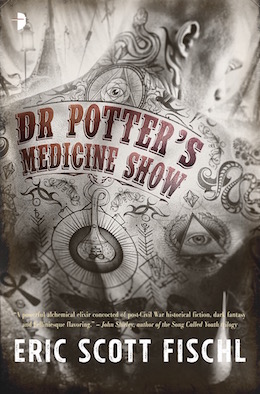When you say “weird Western”, we generally think of Joe Lansdale, Jonah Hex, or maybe a Johnny Depp box-office disaster. But while “weird” comes in all kinds of flavors, from horror and occult to sci-fi- and fantasy, “Western” somehow always paints the same mental picture: an Arizona aesthetic as dry and stark as the backdrop of a Wile E. Coyote cartoon.
Dr. Potter’s Medicine Show aims to change that. In Eric Fischl’s debut novel, a rainy afternoon in 1878 Oregon sets the stage for a snake-oil salesman whose life behind the show-curtains is becoming ever more horrifying, thanks to the sinister contents of the patent-medicine bottles he’s forced to dispense to the desperate and the gullible. The setting is marvelously rendered right from the first page:
The small crowd has drizzle running off their hats and bonnets, the steady rain pooling in puddles underfoot. To a person, they look poor, dirty, and wrung out, or at least give a convincing imitation thereof. A bent-backed farmer grimly digs inside his hairy ear with a finger, while his bug-eyed nervous children clutch at his scrawny wife’s skirts. Two dispirited prostitutes huddle together under a ratty parasol; one has a worse cough than Alexander, a viscous tubercular rattle that he can hear from forty feet away… But even with the rain coming down, there the people stand, wet and shivering, to see the entertainment. However shabby it may be.
Fans of The Gunslinger – and perhaps HBO’s Carnivàle—will recognize the watercolors of the grotesque that Fischl uses to paint the townsfolk and the performers alike. Like a true Western, the setting is a character in itself: a “wet green crumple of a place” whose perpetual “thin mizzling sop” is equal parts oppressive and sickening. And while the weather still strikes a chord with any modern sock-dampened Portlander, our titular antihero defies it in pure vintage rhetoric:
Alexander holds in another cough as he continues troweling on the bullshit that comprises his pitch. “Complaints of the bowels! Headaches! Catarrh! Agues and fevers! Rheumatism, bleeding gums, lassitude and the jaundice! Good people, these are maladies of the body that, once cured, will perk the spirit of a man or woman, a child or a grandfather.”
And even though the Sagwa tonic he’s hawking is something between a fraud and a supernatural poison, Dr. Potter’s defiance of his soggy circumstances might as well be a defiance of our own Game of Thrones-fueled penchant for quasi-historical misery-porn—for imagining the past as a relentlessly nasty, brutal, hopeless time. The locals aren’t passively miserable: they have braved the weather to go have a good time in spite of it—to hear fine music from a pretty girl, have their fortunes read, see marvels of nature floating in formaldehyde, and hope to take a little of that levity home with them in a fancifully-labelled green bottle. And isn’t that what we do every time we pick up a book?
 In any case, it’s what Fischl intends with this book. Sure, there’s depravity and blood magic and body-horror to spare—but there’s also Elizabeth McDaniel, who doesn’t need to know how to saddle a horse in order to knock her brother clean off it. There’s Solomon Parker, the ‘murderous outlaw’ who is terror-stricken on realizing that the girl’s presence at their camp means no more farting at-will around the campfire. And there’s Agamemnon Rideout, who just really, really wants some pie. There is calculated violence on this frontier, and fates worse than death—but there is also enough humor, humanity, and earthy linguistic joy to make Deadwood’s Al Swearengen proud.
In any case, it’s what Fischl intends with this book. Sure, there’s depravity and blood magic and body-horror to spare—but there’s also Elizabeth McDaniel, who doesn’t need to know how to saddle a horse in order to knock her brother clean off it. There’s Solomon Parker, the ‘murderous outlaw’ who is terror-stricken on realizing that the girl’s presence at their camp means no more farting at-will around the campfire. And there’s Agamemnon Rideout, who just really, really wants some pie. There is calculated violence on this frontier, and fates worse than death—but there is also enough humor, humanity, and earthy linguistic joy to make Deadwood’s Al Swearengen proud.
“Now sir,” Sol continues, “…What I would like to know, is if there are a few more notions about our employ that you would be able to give us, to enlighten us, if you will, about our present employment and your particular desires thereof, per se.”
Sol has little experience speaking to educated men but understands that, in such cases, the accepted practice is to use the maximum number of words to convey a given concept, the mark of a heavy thinker. … He also doesn’t quite fathom the exact meaning of per se, reckoning it merely a Latin phrase that learned men use to indicate a verbal pause—something that drew attention to the fact that the previous sentence had contained a generous fucking helping of information, and that more of the same followed.
So even though Dr. Potter rightly belongs on the “horror/occult” side of the Weird Western spectrum, it cleaves apart from the sensational grimdark vogue that so heavily tints our view of the past. Fischl’s command of his characters’ world is grotesque, vivid, joyful, and sublime—an uncommon realism that honors the human side of history, and a reminder that a carnival of horrors is still a carnival, after all, with miracles and spectacles awaiting anyone brave enough to venture into the sideshow tent.
 Arianne “Tex” Thompson is a home-grown Texas success story. After earning a bachelor’s in history and a master’s in literature, she now works as an instructor, public speaker, and “rural fantasy” author. Tex is a member of the Science Fiction & Fantasy Writers of America and the DFW Writers Workshop, and serves as editor for the DFW Writers Conference. Dreams of the Eaten, book three in the Children of the Drought series, is available from Solaris.
Arianne “Tex” Thompson is a home-grown Texas success story. After earning a bachelor’s in history and a master’s in literature, she now works as an instructor, public speaker, and “rural fantasy” author. Tex is a member of the Science Fiction & Fantasy Writers of America and the DFW Writers Workshop, and serves as editor for the DFW Writers Conference. Dreams of the Eaten, book three in the Children of the Drought series, is available from Solaris.










